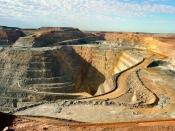Australia's International Trade
"International trade can be defined as the exchange of goods, services or capital between two interested parties, located within different national boundaries". (Fraser, Gionea, Fraser, 1999: p204).
Australia is a relatively small country with its own resources. So therefore Australia must engage in international trade in order to receive resources from other countries that cannot be obtained in Australia. As mentioned by Fraser, Gionea, Fraser (1999: p204), "the world is characterized by an uneven distribution of economic resources". So to even up the distribution of resources, it is extremely to import and export with other nations all around the world.
The reasons for importing are as follows:
Goods are usually cheaper and/or of higher quality
The goods can be produced, but not in sufficient quantities to satisfy consumer's demands.
If a nation does not contain either the resources or the technology necessary to provide a certain commodity, there will be greater demand for it.
The reasons for exporting are:
A rise in employment levels
Export orientated industries will grow in size
Firms within export industries will probably become more profitable
Absolute Vs Comparative advantage
Two major concepts used to explain international trade patterns are:
Absolute advantage and
Comparative advantage
"A country has an absolute advantage in the production of a product if its output per unit of inputs for that product is higher than that of another country" (Mc Taggart, Findlay & Parkin: 1996: G1). Absolute advantage can be due to factors such as climate, land and natural resources, or because of the difference in labour, capital, technology and enterprise. An example of Australia's absolute advantage is that we have an advantage in the livestock and beef industries.
However, if "a country has a comparative advantage in producing a product, it can produce that product at a...


